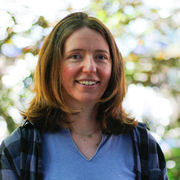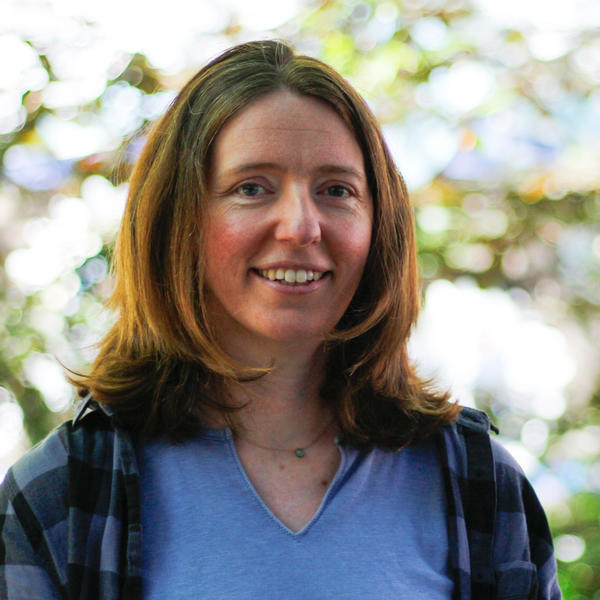Dr Clare Thorpe (she/her)
PhD - Biogeochemistry of Radioactively Contaminated Land
School of Chemical, Materials and Biological Engineering
Senior Lecturer in Materials Degradation & Royal Society Dorothy Hodgkin Research Fellow
Head of second year Materials Science undergraduate students


Full contact details
School of Chemical, Materials and Biological Engineering
Sir Robert Hadfield Building
Mappin Street
Sheffield
S1 3JD
- Profile
-
My research aims to understand the interactions of materials with aqueous environments, their durability and mechanisms of degradation. This is an interdisciplinary endeavor spanning the fields of geochemistry, mineralogy, microbiology and materials science. My research group is an integral part of the Immobilization Science Laboratory, as many of my current projects explore the behavior of materials designed to contain radioactive elements in glasses and ceramics to support their safe disposal.
I currently hold a Royal Society Dorothy Hodgkin Fellowship ""Microbes, minerals and materials heterogeneity; how (bio)geochemical processes affect the behaviour of glassy material"" and a Lectureship within the School of Chemical, Materials and Biological Engineering. Prior to joining the University of Sheffield, I completed a degree in Earth Sciences (2004-2008) and a PhD in the ""Biogeochemistry of radioactively contaminated land"" (2008-2012) from the University of Manchester. I spent three years as a PDRA working towards bioremediation strategies for radioactively contaminated sediment, funded by Sellafield Ltd. I joined the University of Sheffield as a postdoctoral researcher on the US DOE funded project GLAD (Glass Leaching Assessment for Disposability) in 2016 before securing an EPSRC David Clarke Research Fellowship in 2019 followed by my current fellowship in 2023.
My research is currently supported by the US Department of Energy, Sellafield Ltd, Nuclear Waste Services/Nuclear Decommissioning Authority, and the National Nuclear Laboratory. I sit on the Royal Society of Chemistry Radiochemistry Group Committee and UK Nuclear Academics Meeting Committee.
Alongside my love of science, I am a mum, a keen high-latitude sailor and dinghy racer.
- Research interests
-
My research aims to understand the behaviour of materials in complex natural environments with focus on a number of areas including the safe disposal of radioactive waste,the release of toxic elements into the environment, the development of biocidal products and the slow release of nutrients from glass based fertilizers. Understanding material-solution interactions in these systems requires an interdisciplinary approach involving aqueous geochemistry, solid state chemistry, metal and radionuclide redox cycling, geomicrobiology, mineralogy, and materials science.
Key research:
- Evolution of glass alteration layers
- Heavy metal and radionuclide behaviour in natural systems
- Durability of nuclear type glasses, cements and ceramics
- Biological interactions with material surfaces
- Dissolution of heterogeneous material
- Natural analogue studies to inform the long-term behaviour of modern materials.
- Publications
-
Journal articles
- Mass transport behaviour of caesium and strontium in geopolymer cements. Journal of Materials Chemistry A. View this article in WRRO


- Alteration of archeological and natural analogs for radioactive waste glass under different environmental conditions. npj Materials Degradation, 9(1). View this article in WRRO


- Application of pH-dependent environmental protection agency test method 1313 to low-activity nuclear waste glass. Journal of Nuclear Materials, 614, 155858-155858.


- The development and application of the stirred‐reactor coupon analysis (SRCA) test method. International Journal of Applied Glass Science. View this article in WRRO


- Comparison of naturally altered archaeological glasses from a marine environment with accelerated laboratory tests; implications for modelling long-term corrosion. Applied Geochemistry, 184, 106363-106363.


- In situ dissolution of the international simple glass (ISG-1 & ISG-2) and UK high-level-waste glass in extreme γ-radiation environments. MRS Advances. View this article in WRRO


- The effect of magnesia and lime on the durability of synthetic basaltic glasses. Journal of Non-Crystalline Solids, 656. View this article in WRRO


- Insights into long term glass corrosion mechanisms from the Ballidon experiment. npj Materials Degradation, 9(1). View this article in WRRO


- The effectiveness of TRIS and ammonium buffers in glass dissolution studies: a comparative analysis. npj Materials Degradation, 9(1). View this article in WRRO


- Microbial interactions with phosphorus containing glasses representative of vitrified radioactive waste. Journal of Hazardous Materials, 462. View this article in WRRO


- Localised extended (“vermiform”) features formed during glass dissolution. Journal of Non-Crystalline Solids, 608. View this article in WRRO


- Micro- and nanoscale surface analysis of late Iron Age glass from Broborg, a vitrified Swedish hillfort. Microscopy and Microanalysis, 29(1), 50-68. View this article in WRRO


- Surface interfacial analysis of simulant high level nuclear waste glass dissolved in synthetic cement solutions. npj Materials Degradation, 6(1). View this article in WRRO


- Forty years of durability assessment of nuclear waste glass by standard methods. npj Materials Degradation, 5. View this article in WRRO


- Applying laboratory methods for durability assessment of vitrified material to archaeological samples. npj Materials Degradation, 5(1). View this article in WRRO


- Positron emission tomography to visualise in-situ microbial metabolism in natural sediments. Applied Radiation and Isotopes, 144, 104-110.


- Quantifying Technetium and Strontium Bioremediation Potential in Flowing Sediment Columns. Environmental Science & Technology, 51(21), 12104-12113.


- Evaluation of novel leaching assessment of nuclear waste glasses. MRS Advances, 2, 635-640. View this article in WRRO


- Retention of 99mTc at Ultra-trace Levels in Flowing Column Experiments – Insights into Bioreduction and Biomineralization for Remediation at Nuclear Facilities. Geomicrobiology Journal, 33(3-4), 199-205. View this article in WRRO


- Neptunium and manganese biocycling in nuclear legacy sediment systems. APPLIED GEOCHEMISTRY, 63, 303-309.


- The interactions of strontium and technetium with Fe(II) bearing biominerals: Implications for bioremediation of radioactively contaminated land. Applied Geochemistry, 40, 135-143.


- The Synergistic Effects of High Nitrate Concentrations on Sediment Bioreduction. Geomicrobiology Journal, 29(5), 484-493.


- Strontium sorption and precipitation behaviour during bioreduction in nitrate impacted sediments. Chemical Geology, 306-307, 114-122.


- Alkaline Fe(III) reduction by a novel alkali-tolerant Serratia sp. isolated from surface sediments close to Sellafield nuclear facility, UK. FEMS Microbiology Letters, 327(2), 87-92.


Conference proceedings
- Insights into vitrified nuclear waste alteration from glasses exposed to complex natural environments.. Goldschmidt2025 abstracts, 6 July 2025 - 11 July 2025.


- The HADES facility for high activity decommissioning engineering & science: part of the UK national nuclear user facility. IOP Conference Series: Materials Science and Engineering, Vol. 818. Manchester, UK, 4 February 2020 - 4 February 2020. View this article in WRRO


- Evaluation of novel leaching assessment for nuclear waste glasses. 44th Annual Waste Management Conference (WM2018) : Nuclear and Industrial Robotics, Remote Systems and Other Emerging Technology, Vol. 1 (pp 3317-3323). Phoenix, Arizona, USA, 18 March 2018 - 18 March 2018. View this article in WRRO


- Dissolution of glass in cementitious solutions: An analogue study for vitrified waste disposal. MRS Advances, Vol. 3(21) (pp 1147-1154) View this article in WRRO


- Interactions between Simulant Vitrified Nuclear Wastes and high pH solutions: A Natural Analogue Approach. MRS Advances, Vol. 2(12) (pp 669-674) View this article in WRRO


Preprints
- Alteration of archeological and natural analogues for radioactive waste glass under different environmental conditions, Springer Science and Business Media LLC.


- The Effectiveness of TRIS and Ammonium buffers in Glass Dissolution Studies: A Comparative Analysis, Springer Science and Business Media LLC.


- Insights into long-term glass corrosion mechanisms from the Ballidon project: a 50-year-old glass burial experiment in an alkaline near surface environment., Springer Science and Business Media LLC.


- Mass transport behaviour of caesium and strontium in geopolymer cements. Journal of Materials Chemistry A. View this article in WRRO
- Research group
-
Current students:
- Garry Manifold, "Alteration of vitrified radioactive waste in low temperature natural environments: a natural analogue approach." (funded by Nuclear Waste Services)
- Eperke Rencz, "Alteration mechanisms of vitrified radioactive waste." (Funded by Royal Society and UKNNL).
- Harley Bestwick, "Nearfield interactions of ILW glass; radionuclide transport at the glass-canister-backfill interface." (Funded by Sellafield Ltd and EPSRC through the SATURN CDT)
Previous PhD students:
- Daniel Parkes "Thesis - Characterisation of thermally treated products" (Funded by TRANSCEND) - Completed 2024.
- Rachel Crawford "Thesis - The Impact of Iron on the Durability of Vitrified UK High Level Waste". (Funded by EPSRC through the GREEN CDT) - Completed 2025
Jenny Ayling "Thesis - the dissolution of vitrified nuclear waste forms as a function of groundwater composition; the effect alkali and alkali earth cations on glass durability." (Funded by the NDA/UKNNL) - completed 2025
- Grants
-
Active grants:
- 2023-2028: Centre of Expertise for Thermal and Immobilisation (Sellafield Ltd.)
- 2024 – 2032: Royal Society Dorothy Hodgkin Fellowship Microbes, minerals and materials heterogeneity; how (bio)geochemical processes affect the behaviour of glassy material (Royal Society)
- 2016-2026: Project GLAD (Glass leaching assessment for disposability) (US Department of Energy)
- 2020-2024: PhD Studentship: Alteration of vitrified radioactive waste in low temperature natural environments: a natural analogue approach (NWS – RSO).
Past grants:
- 2019-2020: Royal Society of Chemistry Research Fund: what can shipwreck glasses tell us about radioactive waste (RSC).
- 2019-2023: EPSRC David Clarke Fellowship: Durability of vitrified radioactive waste in complex natural environments (EPSRC).
- 2016: Mineralogical Society of Great Britain and Ireland Early Career Bursary: The Ballidon Glass Burial Project from a Geochemist’s Perspective
- 2014-2015: Knowledge Transfer project: feasibility and longevity of bioremediation at Sellafield. (EPSRC/Sellafield Ltd)
- 2015: University of Manchester ‘Seed corn’ funding to investigate the use of PET-CT in imaging microbial processes
- 2012-2013: Knowledge Transfer project: column studies towards the feasibility of bioremediation (EPSRC/Sellafield Ltd)
- Teaching activities
-
I teach materials corrosion chemistry to 3rd year material science students (MAT373 - Surface degradation and protection). In addition, I supervise undergraduate and postgraduate final year research projects, assist on the 2nd year Research Perspectives module (MAT214/2930), act as an academic tutor and contribute to Postgraduate teaching of the NTEC and SATURN CDT programs.
- Professional activities and memberships
-
- Member of Royal Society of Chemistry
- Member of the Royal Society of Chemistry Radiochemistry Group Committee
- Member of the Mineralogical Society of Great Britain and Ireland
- Fellow of Higher Education
